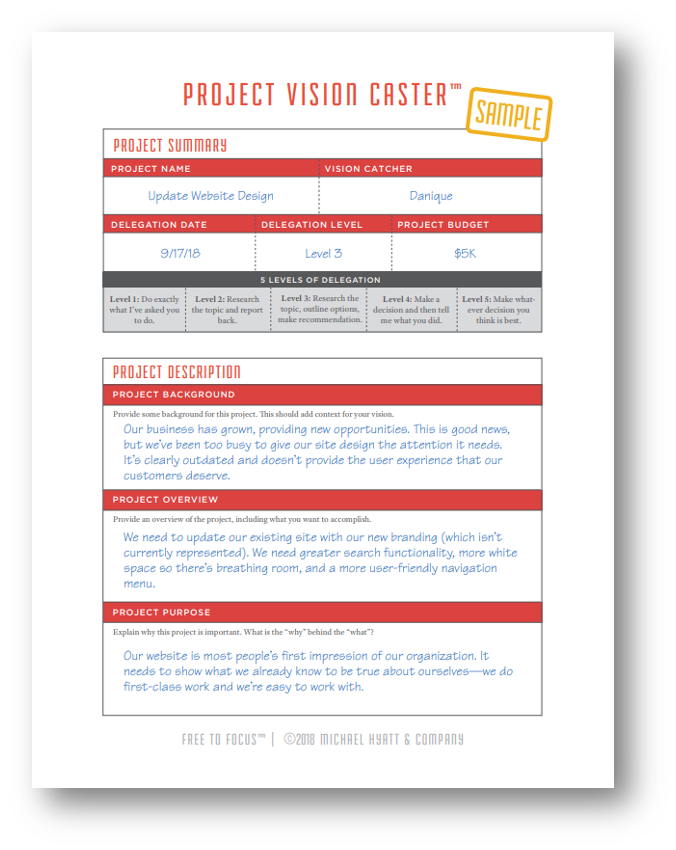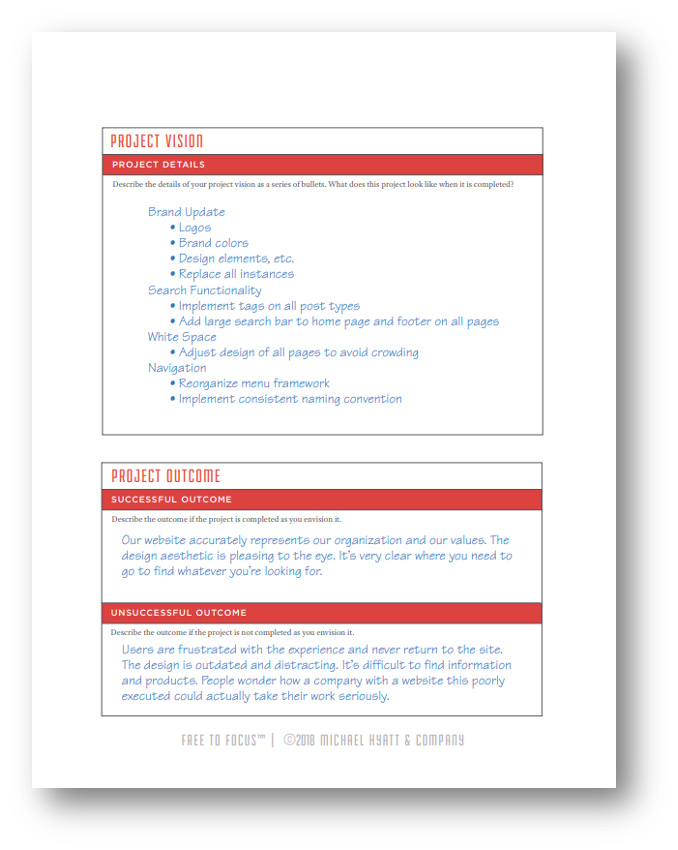Delegate: Clone Yourself – or Better, page 137.
“I purposed to never do anything that others could or would do when there was so much of importance to be done that others could or would not do.” – Dawson Trotman
- Researchers use the term “Time Famine” to describe the feeling of having more tasks than time.
- Researchers at Harvard Business School found the trick to overcoming time famine and improving feelings of well-being and life satisfaction was simple – buy more time.
- How’s that possible?
- After you’ve eliminated and automated as much as possible, you’re left with a shorter list of critical tasks that must be done by someone.
- The question is, does that someone have to be you?
- You can’t buy happiness, but you can buy back your time by offloading tasks you deem stressful or unlikable.
- Researchers found that “spending money to buy time” was linked to greater life satisfaction.
Wait, Wait, Hold On…
- Delegation means focusing primarily on the work only you can do by transferring everything else to others who are more passionate about the work or more proficient in the tasks.
- Sometimes this is hard for high achievers. Especially if you’re cursed with being halfway decent at wearing all the hats in your business. I say “cursed” because this is not a compliment. Would you ever knowingly hire someone only halfway decent?
- Delegation does require us to slow down long enough to get a new person up to speed. But in the long run, training and trusting others frees up time in our Desire Zone. It’s like buying time!
- The hours you spend on Desire Zone tasks will always be more profitable than the time you’re wasting anywhere else, so the cost of delegation pays for itself – and then some.
- The most depressing excuse for not delegating is, “I’ve tried delegation, and it didn’t work.”
- Everything good in our lives is the result of extensive, exhaustive trial and error.
- If you’re letting one or two failures keep you from implementing a major productivity solution, you’ve got bigger problems than an out-of-control to-do list.
The Delegation Hierarchy
- Run through your Freedom Compass in reverse order, looking for key Desire Zone activities that only you can and should be doing.
- The remaining activities are all candidates for Delegation.
The Delegation Process
- Many people think delegation is simply a matter of handing someone a task and some instructions. Not usually.
- Delegation is a process and requires an investment of your time.
- Your goal is to develop passionate, proficient team members whom you can trust with the most delicate tasks, and this will happen only when you walk them through a trust-and-skill-building process:
- Decide what to delegate
- Start with the tasks in your Drudgery Zone.
- Next move to the tasks in your Disinterest and Distraction Zones.
- Select the best person
- Try to find someone with passion and proficiency for the task (their Desire Zone).
- To become a master delegator, you must develop the patience and attentiveness to match the task to the person.
- Communicate the workflow
- If you have a documented workflow, show them how to use it.
- If you don’t have a documented workflow (yet), walk through what you need to be done and the outcome you’d like to see.
- Depending on the person you chose and the complexity of the task, you may let them try to document the workflow themselves.
- Provide the necessary resources
- Carefully think through every step of the process and make sure that you are handing off everything they’ll need to win (logins, software, keys, tools, authorization, etc.).
- Specify the delegation level
- Clearly communicate your expectations, beyond simply relaying the step-by-step tactical instructions.
- Be clear about what level of authority you are giving them.
- Give them room to operate
- This is where delegation breaks down for a surprising number of people.
- Sometimes we can’t make the emotional leap that enables us to get out of the other person’s way.
- Be careful, this is where micromanagers are born.
- Check-in and provide feedback as needed
- While you don’t want to micromanage, it’s a mistake to think you’re completely out of the process once you hand the task to someone else.
- Delegation is not abdication. The outcome is still your responsibility.
The Five Levels of Delegation
- Level 1
- When you want the person to do exactly what you’ve asked them to do – no more, no less.
- You have already researched the options and determined what needs to be done.
- This level is perfect for new hires, entry-level positions, contractors, or virtual assistants.
- Level 2
- This is where you want a person to examine or research a topic and report back to you on their findings. That’s it.
- Clarify what you mean by research: Google, online survey, call customers, solicit bids from vendors, etc.
- Have a conversation to discuss their findings.
- You make the decision.
- Level 3
- Starting with #3, you’re giving the person more room to operate and participate in the problem-solving process, but you’re still reserving the final decision for yourself.
- Have the other person research the topic, outline the options (with Pros and Cons), and then make a recommendation.
- They shouldn’t expect you to agree with their decision without first giving you the chance to see inside their thought process and explain why they made the decision they did.
- If you agree with their decision, give the final approval and authorize them to move forward.
- This is a great option for delegating to future leaders you’re mentoring because it gives you a safe opportunity to judge their decision-making skills without any risk.
- This is the level where you start to outsource your decision-making. You can make a well-informed decision on a complex topic in one simple meeting. What may have taken you a full week can now be knocked out in an hour.
- Level 4
- At Level 4 you want the person to evaluate the options, make a decision on their own, execute the decision, and then give you an update after the fact.
- Sometimes you might want them to keep you apprised of their progress.
- Keeping you informed is not about second-guessing their decision, but about keeping you aware and providing you insight into the quality of their decisions, which is good to know for future delegation.
- If requesting progress updates along the way, be specific about how often and through what channel you would like your updates.
- Level 4 is great for growing leaders, assignments that aren’t mission-critical, and assignments where you don’t have a strong preference regarding the outcome.
- Level 5
- Level 5 is perfect for when you have complete confidence in the person to whom you’re delegating.
- Level 5 is also perfect for assignments that need to be handled but you really don’t care how it’s resolved.
Next Steps
- I suggest implementing the Five Levels of Delegation by walking your entire team through the five levels and explaining how you’re going to approach delegation from now on.
- Incorporate the level by name into your company’s vocabulary.
- All of this will create a much safer, clearer environment in which everyone knows what responsibility they have in a delegation situation.
Buy Back Your Time
- People often don’t delegate because they think it’s faster or easier to do the job themselves.
- They’re right. It is easier to do a single task one time than it is to teach someone else how to do it and walk them through the delegation process and levels.
- But the thing is, most tasks are not one-time occasions.
- Time is fixed, but you can buy more. And you’ll simply never become free to focus on the things that really matter – your top priorities, key relationships, your most important projects – until you learn how and why to delegate.
Exercise: Project Vision Caster
- It’s time to finish the Task Filter worksheet you’ve been working on.
- By now you’ve listed and categorized your daily tasks and marked which you can eliminate and automate.
- Now, what can you delegate?
- First, pick at least one task to delegate today.
- Next, download the Project Vision Caster at FreeToFocus.com/tools.
- The Project Vision Caster will help you translate your vision for a project or task to paper so your team can see it clearly and execute it with excellence.
- Use the Project Vision Caster to prepare a team member for the responsibility, and carefully choose a Delegation Level that is appropriate.
- Hand it off.





